Micro-climate, Macro-effect
The Snowmageddon of February 2021 totally wiped out 26 of my agaves. But a tender perennial, variegated ginger, made a surprising comeback.
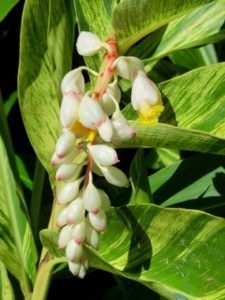
Fig. 1 – Alpinia zerumbet flowers
My Variegated Ginger (Alpinia zerumbet) was a real specimen plant, anchoring one end of my front porch. It was ideally situated: sheltered by the house on one side and the porch on the other, next to an intake to a French drain. It got six hours or less of sun a day. Over the eight years it had been in place, it had grown to six feet tall and eight feet wide. It even flowered one year. [Fig. 1]
When the snow finally melted on February 16th, the damage looked fatal. The weight of the ice had broken most of the stalks. The few that remained upright were brown and mostly shredded. [Fig. 2]
I was vaguely hopeful, so I left it as-is for a few weeks – to no avail. Reality finally set in. I cut it all to the ground in early March. [Fig. 3]
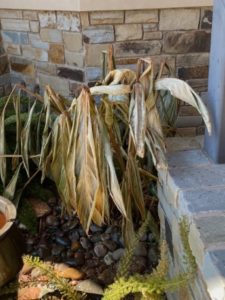 |
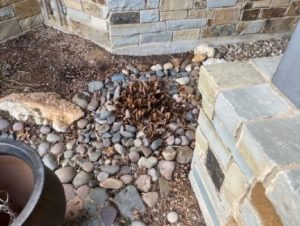 |
| Fig. 2 – Freeze damage appears fatal. | Fig. 3 – The plant cut back to the ground. |
The Virtue of Patience
By the time April rolled around, there were some very minor signs of encouragement. [Fig. 4] Those little sprouts along with Texas A&M Forestry Service advice not to act hastily was enough for me to leave it alone for another month.
In May, I saw some real progress. Not massive growth. But more and more sprouts and some fully-formed (though tiny) leaves. [Fig. 5] Patience is not my natural habit. Renewed hope kept me from digging it up. And I am so glad I resisted.
 |
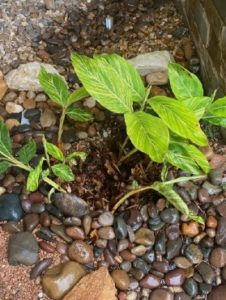 |
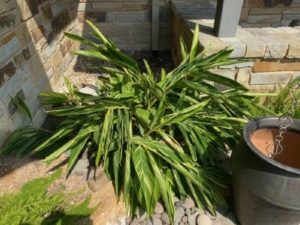 |
| Fig. 4 – Shoots emerging! | Fig. 5 – New leaves unfurling. | Fig. 6 – Mostly recovered by September |
The summer was good to the Variegated Ginger. By September it had mostly recovered. [Fig. 6] The stalks were not as strong or as tall as before. And some of the newer leaves were still curled. But it was clearly returning to its earlier glory.
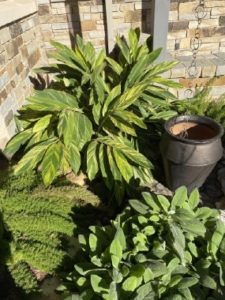
Fig. 7 – Fully recovered!
At year’s end, the plant clocked in at four-and-one-half feet tall and seven feet wide with increasing density. [Fig.7] It’s well on its way to reaching its original six feet height and eight feet width.
I’m convinced this rebirth could not have happened without the confluence of multiple environmental factors: the right amount of sun, protective shelter, and water funneling through to the French drain. The ideal micro-climate for a welcome comeback. A pleasure I see every time I drive by. I wish I could say the same for my agaves.
Additional Resources
Kirk is participating in the Travis County Master Gardener Winter Storm Project.
Weather Strategies for Austin Gardens
Native and Adapted Landscape Plants searchable database
Climate Graph for Austin Bergstrom
About Kirk Walden

Kirk is a hands-on experiential gardener. While he appreciates the cerebral aspects of gardening, he revels in the visceral experience of digging in the dirt. When he moved to Austin in 1998, the home had virtually no landscaping, mostly just limestone and cedars. His determination to beautify it led to an avocation as a serious gardener that culminated in Travis County Master Gardener Certification in 2014.
